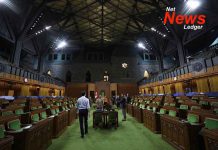OTTAWA – ENVIRONMENTAL – First Nations leaders are escalating their fight against a controversial radioactive waste disposal facility approved near the Ottawa River. They brought their concerns directly to Parliament Hill on February 14, urging the federal government to overturn the project over threats to waterways, wildlife, and Indigenous rights.
The Canadian Nuclear Safety Commission (CNSC) approved the Chalk River facility on January 8th, designed to store low-level radioactive waste just one kilometre from the Ottawa River.
The decision sparked widespread backlash, with critics pointing to potential contamination concerns and a disregard for Indigenous communities.
Chief Lance Haymond of Kebaowek First Nation, located near the proposed site, underscored the determination to safeguard water resources for all Canadians. Kebaowek is legally challenging the decision, claiming a failure of proper consultation and consent.
Environmental groups have also filed a lawsuit over the facility’s potential to cause serious health issues due to long-lived radioactive pollutants. The chosen location near the Ottawa River, a vital waterway and ecosystem, raises the risk of irreparable damage.
Local Connections
This story resonates strongly in Thunder Bay and across Northwestern Ontario, where communities are engaged in a similar debate over nuclear waste disposal. Concerns surrounding Indigenous consent and the protection of waterways are shared across both regions.
Call for Respect and Environmental Safeguards
Over 140 municipalities in the affected area have voiced opposition. Leaders from multiple political parties are supporting the Indigenous communities, highlighting the failures in consultation and environmental review processes.
This growing movement to stop the Ottawa River nuclear waste facility emphasizes the power of Indigenous voices in protecting natural resources. It calls for responsible decision-making based on respect for First Nations’ rights and a commitment to a healthy environment for future generations.








